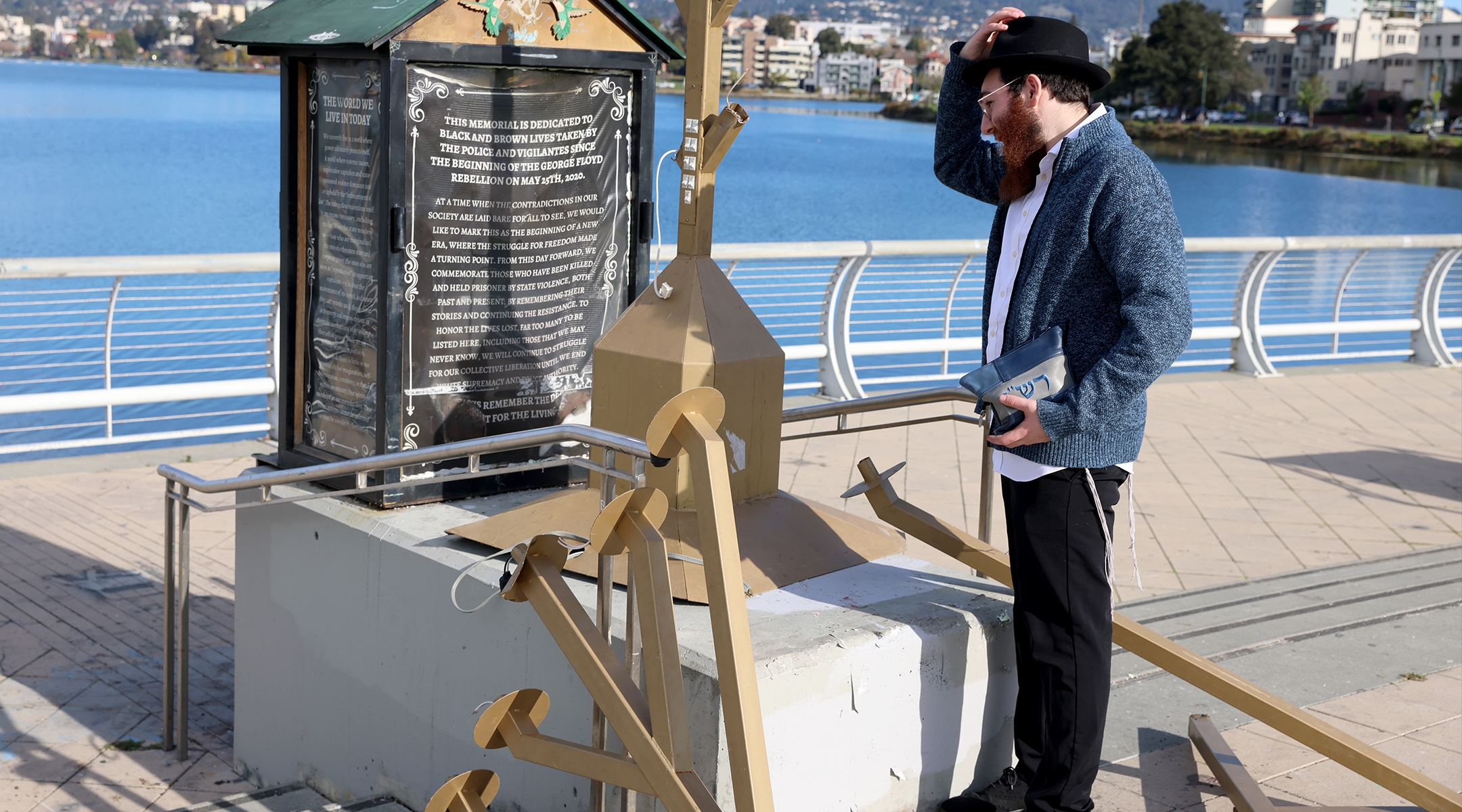Menorahs across the US are vandalized as Jewish communities celebrate Hanukkah amid a spike in antisemitism
A Chabad spokesman said there are more public menorahs this year than ever before, and attributed the increase to the Israel-Hamas war

Moshe Turk of the Chabad Jewish Center of Oakland looks at a damaged menorah at the Lake Merritt Amphitheater in Oakland, Calif., Dec. 13, 2023. (Jane Tyska/Digital First Media/East Bay Times via Getty Images)
(JTA) — In Oakland, California, an 11-foot tall Hanukkah menorah was broken and thrown into a lake. In New Haven, Connecticut, a Palestinian flag was planted in a publicly displayed menorah. In Juno Beach, Florida, a menorah made of sand was destroyed.
As Jewish communities around the United States celebrated Hanukkah over the past week, numerous stories of vandalism and destruction circulated online as public menorahs — many of them sponsored by local outposts of the Chabad-Lubavitch movement — were targeted. Some of the incidents are being investigated as hate crimes.
The acts of vandalism come at a time when Jewish communities are on high alert as watchdogs say antisemitism has spiked around the globe since Oct. 7, when the Israel-Hamas war began. Many communities had planned gatherings explicitly drawing connections between the war and the Hanukkah holiday, which began Dec. 7 and concludes on Friday. In response to the uptick in antisemitism and fear, one Jewish father launched an online campaign encouraging non-Jews to display menorahs in their windows out of solidarity.
For decades, public menorah lightings have been commonplace in many cities around the United States, especially in ceremonies led by local Chabad rabbis. The Hasidic movement organized an estimated 15,000 lightings annually in recent years, and this Hanukkah it puts the number at more than 10% higher — an increase Chabad spokesman Rabbi Motti Seligson attributed in part to the war in Israel and Gaza.
“Jews from across the spectrum of observance are celebrating Hanukkah more visibly this year than ever before,” Seligson said. “They feel they don’t have a choice. It’s in response to Oct. 7.”
Boruch Klar, who runs Menorah.net, which bills itself as the “world’s largest manufacturer of public display menorahs,” said his company’s sales have steadily increased every year, 2023 included. He noted that the company’s sales to municipal and state offices, mostly in the United States, have increased 150% this year.
“The numbers are so high that I can’t actually believe it,” said Klar, a Chabad rabbi who sells menorahs as tall as 12 feet to army bases, shopping malls, sports teams and beyond. He said he sells thousands of menorahs each year but declined to give exact sales numbers.
The prevalence and size of public menorahs makes them easy targets for people seeking to vandalize Jewish property or just cause mischief. And since the holiday began, several incidents of vandalism and destruction of menorahs have been reported around the country — though not, Seligson said, at an appreciably higher rate than in the past.
“Hanukkah came as the perfect antidote to the adversity and the darkness,” Seligson said, noting that Chabad is not formally tracking vandalism incidents. “In the sum total, we’re seeing a lot more light.”
Still, the incidents of vandalism have been jarring to Jewish communities already on edge.
In Oakland, Chabad had assembled a 350-pound menorah that was displayed on a walking trail at the city’s Lake Merritt. Chabad hosted a candle lighting ceremony on Sunday, the fourth night of the holiday, featuring remarks from Mayor Sheng Thao.
On Wednesday morning, Rabbi Dovid Labkowski received text messages saying the menorah had been destroyed. He called the mayor’s office and rushed to the scene, he told J. The Jewish News of Northern California.
Pieces of the menorah had been cut up and thrown across the sidewalk and into the lake. Antisemitic graffiti was scrawled onto the base, including “we’re gonna find you” and “you’re on alert.” “Free Palestine” was written in Arabic near where the menorah had stood. Oakland police are investigating the incident as a hate crime.
“I felt outraged,” Labkowski told the J. “There’s crime in this city, but it just hit a new level of antisemitism. Together with the crime — it just makes you feel hopeless.”
On Wednesday, a large interfaith crowd gathered to light a new menorah and show support for the local Jewish community.
In New Haven, a pro-Palestinian protester climbed the city’s 30-foot menorah and planted a Palestinian flag between the candles. The menorah was not damaged, but local authorities are investigating the incident, which was caught on camera.
The Jewish Community Synagogue in North Palm Beach had commissioned an artist to create a menorah out of sand in Juno Beach — which was destroyed and defaced with a swastika. After the incident, which is under investigation, the local Jewish community gathered to rededicate the menorah, which was rebuilt.
Menorahs were also vandalized in the Washington, D.C. suburb of Olney, Maryland, the Chicago neighborhood of Lakeview and suburb of Northbrook, as well as in Brooklyn, where two public menorahs were damaged. The two Brooklyn incidents are being investigated as hate crimes, according to the NYPD.
Public menorahs have also been the scenes of dramatic incidents in Europe. In Poland, a far-right member of parliament shocked the chamber when he used a fire extinguisher to blow out the candles of a menorah in the government building. In the Dutch town of Enschede, the mayor refused to be seen with the Netherlands’ Israeli ambassador at a Hanukkah event. And a public menorah was found toppled in West Hempstead, London, on Thursday morning, with a “Free Palestine” sticker affixed to its base.
Rabbi Dovid Katz of the West Hampstead Chabad told the Jewish Chronicle of London that next year he would put up four at the same intersection.
This article originally appeared on JTA.org.












